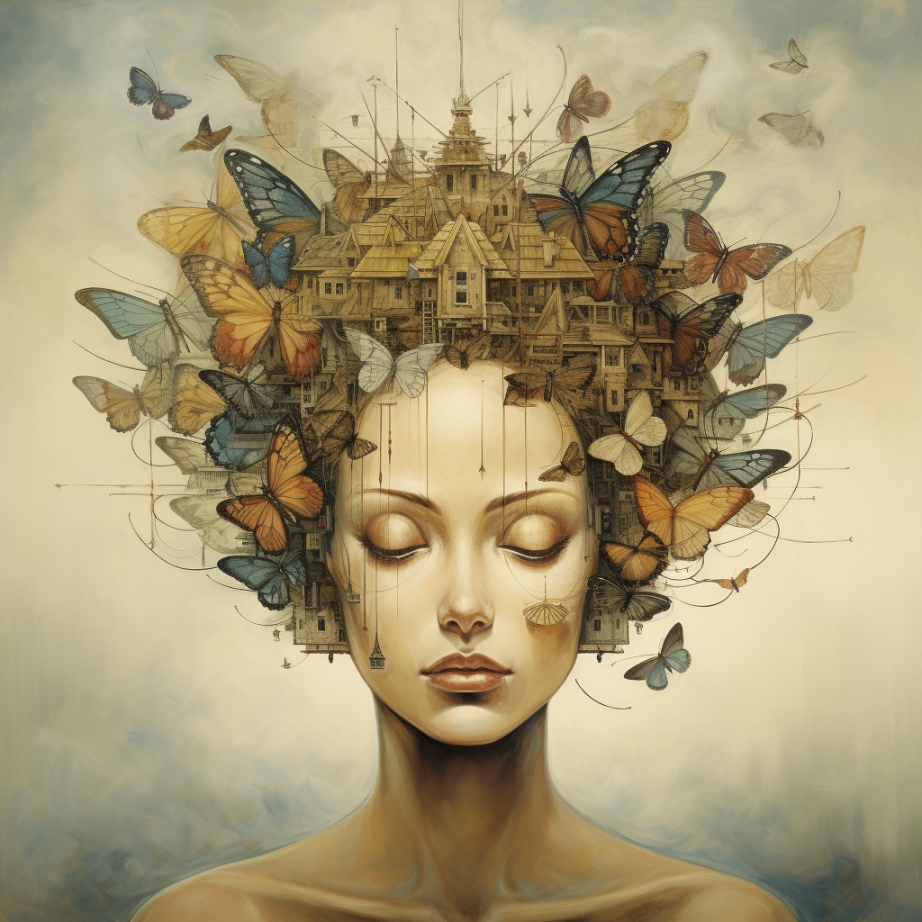When I was younger, I felt lost. I didn’t know my likes or dislikes, nor did I have a clear direction in life. Despite having everything one might wish for, I felt stressed and restless.
To escape these feelings, I spent countless hours playing video games, thinking I enjoyed them. In reality, they were just distractions.
Instead of exploring who I really was, I busied myself with activities that masked my true feelings. I overlooked the most important journey of all—the journey of self-discovery.
The moment I embarked on the quest to answer “Who am I?” my life began to align more authentically with my true self.
Understanding yourself means you no longer feel the need to mimic others. It’s in knowing yourself deeply that your life transforms significantly.
The key to living fully is to connect with your unique self and embrace your authenticity without conditions.
Sounds appealing, doesn’t it?
Indeed, it’s that impactful. So, let’s get started with the million-dollar question of how to get to know yourself!
How to Know Yourself Deeply: The Challenges

Are you curious about how to get to know yourself? In your journey, if you have ever felt why do I struggle to know myself, here are the 4 common blockers you might be dealing with:
Facing the Unknown
Starting new ventures or chapters in our lives is often filled with uncertainty. Many of us prefer to stay in our comfort zones, even if they’re uncomfortable, simply because they’re familiar to us. As we strive to be true to ourselves, we encounter unfamiliar and intimidating challenges.
We might not know what lies beyond our current struggles, such as dissatisfaction or unfulfillment, and might doubt the possibility of achieving something more fulfilling. This doubt hinders our progress toward the growth and change we seek.
Facing the Dark Night of the Soul
Another big challenge in the journey of self-discovery is what’s often called “the dark night of the soul.” This is a tough phase where you might feel lost, confused, and very down. But, after getting through this hard time, most people find they end up with a strong sense of who they are and feel a great sense of personal victory.
The Trap of Comparison
We often compare ourselves to others, which can blur our understanding of our true desires. Seeing others achieve milestones like a new job, exotic vacations, or starting a family might make us feel pressured to pursue similar paths, even if we don’t genuinely want those things. This comparison can trap us in a cycle of thinking about what we “should” do instead of what we “want” to do.
Many people struggle to articulate their desires because they’re overwhelmed by societal expectations about what they should want and who they should be. It’s challenging to ignore these external pressures and focus on our own preferences and goals.
Losing Connections on Your Journey
As you find yourself, you might notice tension with friends or family who aren’t comfortable with the changes you’re going through. For instance, if you used to always say yes to others, you might start saying no more often. This change can upset people who liked things the way they were.
You might discover that some relationships were one-sided, benefiting from your tendency to please others. As you change, not everyone will like the new you, and that’s perfectly fine. Part of this journey is learning that you can’t please everyone and recognizing who truly supports you. As you evolve, your circle of friends and acquaintances might evolve, too.
How to Get to Know Yourself: 16 Simple Tips

If you need an answer to how do I start knowing myself, here are the 16 most simple yet effective tips to start with:
Discovering Your Core Values
A great starting point in the journey of self-discovery is to identify your core values. These are the principles that hold the highest importance in your life, such as integrity, empathy, or creativity. Spend some time reflecting on what truly matters to you and pinpoint the values that deeply resonate with you.
Once you’re clear on your values, you can begin to align your life more closely with them. This means making decisions and taking actions that reflect what you value most, ensuring that your life is a true representation of your core beliefs.
Reflecting on Your Past
While it’s common advice to leave the past behind to move forward, looking back can actually help you discover yourself. Consider times in your life when you felt genuinely happy and content. Think about the activities you enjoyed, the people you were with, and what made those times feel so special. Use these reflections as a guide to reintroduce similar joys into your life today. It’s not about replicating the past exactly but rather drawing inspiration from it.
Additionally, take some time to ponder how and when you might have lost touch with what made you happy. Identifying when things started to change for the worse can help you understand what needs to be addressed or changed to regain a sense of self and happiness.
Start Journaling

Keeping a journal is an effective strategy for how to know yourself better through reflection on daily experiences. Consider starting a journaling habit. Each day, take a moment to reflect on yourself. Note down what brings you joy, what doesn’t, and any new thoughts, feelings, or experiences you encounter. This practice can help you connect more deeply with yourself.
Embrace Mindfulness
Incorporate mindfulness into your daily life to further aid in discovering yourself. Mindfulness involves being fully present and paying attention to your thoughts, feelings, and environment without judgment. This practice can enhance your self-awareness and provide deeper insights into your inner world.
Embarking on a solo travel adventure can be a transformative experience in how to know about yourself.
Build Inner Trust

The journey to self-discovery heavily relies on cultivating trust in yourself. If you’ve always lived according to what others expect of you, you might not have had the chance to develop this self-trust. However, trusting yourself enables you to take risks and step out of your comfort zone more confidently.
Instead of focusing on past mistakes, a powerful method to build this trust is to acknowledge your successes. Reflect on your achievements and moments where you’ve supported yourself. Recognizing these victories can strengthen your belief in your abilities.
Understanding why do I cry when am angry is a powerful step towards self-awareness and emotional well-being.
Seek Inspiration from Role Models
Finding people who inspire you can significantly aid in discovering who you want to become. Often, we tend to follow in our parents’ footsteps, both knowingly and unknowingly. However, truly finding yourself involves identifying with values and paths that resonate with you personally, not just those you were born into.
Pay attention to who inspires you and what specifically about their actions or life path speaks to you. These role models can be anyone from your personal life, characters from TV shows, public figures, or online creators. Their influence can help shape your understanding of who you aspire to be.
Rediscover Your Natural Curiosity
Think about how as children, our curiosity drives us to explore, moving from crawling to walking just to see more of the world around us. Sadly, as we grow older, constant warnings to “be careful” can dim this spark of curiosity, leading us to choose safer paths.
However, reconnecting with our natural curiosity opens us up to the joys of life and helps us discover our true selves. This means asking questions and making decisions based on genuine interest and kindness towards ourselves. It’s about welcoming new possibilities and accepting that making mistakes is part of the journey. These experiences don’t limit what we can achieve or who we can become.
Experiment with New Experiences
Exploring new activities can reveal your interests, talents, and what gives your life meaning and purpose. It’s also a great way to step out of your comfort zone and challenge yourself. Start by making a list of hobbies or activities that have always sparked your curiosity. Choose one to begin with. Remember, it doesn’t have to be a grand or costly endeavor; even small changes like testing a new recipe or taking a new path to work can make a big difference.
Prioritize Self-Care
Embrace the concept of treating yourself well. It’s crucial to allow yourself to enjoy life and believe you’re worthy of happiness. Taking care of your physical and emotional needs is a key step in discovering who you are. Dedicate time to activities that bring you joy, whether it’s working out, reading, or spending quality time with friends and family. Consider it as dating yourself.
It’s essential to recognize and understand the emotions behind your reactions. If you’ve ever wondered, “why do I get angry over small things,” it’s an opportunity to explore the deeper feelings fueling your anger, such as frustration, feeling misunderstood, or helplessness.
Challenge Your People-Pleasing Habits
Overcoming the urge always to please others is vital in your journey to self-discovery. Constantly trying to ensure everyone else’s happiness can distract you from your own needs and desires.
Approach your tendency to please others on an individual basis. If you catch yourself concocting scenarios to justify excessive efforts for someone’s approval, consider doing the opposite. If your instinct is to go above and beyond without a clear reason, try scaling back your efforts. You may discover that the other person doesn’t perceive any difference in your relationship and continues to value you just the same.
Use Positive Self-Talk
During your journey of self-discovery, you’ll encounter both uplifting and challenging moments. It’s crucial to treat yourself with compassion and speak kindly to yourself. Incorporating positive affirmations can be a powerful tool to counteract any negative thoughts that might cloud your self-perception. Remember, it’s difficult to understand yourself if you’re constantly critical truly.
Find Your Creative Zone
The concept of “flow” refers to a state of mind where you’re completely immersed in an activity that not only challenges you but also brings deep satisfaction and joy. This could be writing for an author, composing or playing music for a musician, or facilitating healing for a therapist. Identifying the activities that put you in this state can be incredibly revealing, offering insights into your life’s purpose and how you can contribute positively to the world.

Go to Therapy
Considering therapy can be a significant step in your journey of self-discovery. A therapist can guide you in identifying what truly matters to you and assist in making choices that reflect your core values.
Take Your Time
Finding yourself is a process that requires patience. Rather than fixating on the destination, try to appreciate the journey and the insights you gain along the way. Remember, experiencing this process is unique for everyone, and it’s okay to take your time. Offering yourself kindness and understanding throughout this journey is crucial. After all, we’re all navigating life for the first time.
Reflecting on Your Personal Story
Every choice and action we take is shaped by the narrative we believe about ourselves, a narrative that starts forming in our childhood as we seek love and approval from those around us. The experiences we go through and the knowledge we acquire over the years continue to mold this narrative as we grow into adults.
Embarking on the journey of self-discovery begins with reflection. Consider using a journal to trace back to how you’ve become the person you are now. Starting a meditation practice can also help quiet your mind, allowing you to explore the depths of your true self. Expressing your feelings can be incredibly freeing and is a crucial step towards understanding and discovering your true self.
Taking time for solitude and meditation can be powerful for how to get to know yourself on a deeper level.
Overcome Negative Self-Talk
As you dive into your personal story and start identifying what truly matters to you, you’ll become more aware of the way you talk to yourself. Have you ever really listened to it? Is it filled with encouragement or criticism? Does it motivate you to step out of your comfort zone, or does it scare you into staying put?
If you find yourself doubting your ability to discover your true self, it’s time to challenge your inner critic. Look at your thoughts as if you were talking to a dear friend. You wouldn’t let a friend speak to themselves in a harmful way, right? When you catch yourself thinking negatively, consciously choose to replace those thoughts with positive, supportive ones that propel you toward your aspirations, not away from them.
The Takeaways for How do I truly find myself
“Finding yourself” isn’t a destination but a continuous exploration. Unlock your true potential with “how to find yourself.” Start your adventure with an open mind and a guide by your side.
The path to discovering who you are is a journey many of us embark on throughout our lives. It’s not a simple task you can just tick off and move on. As we evolve, so does our understanding of ourselves, revealing new layers and aspects to explore.
The key to this journey is to stay open to new experiences, question old beliefs that no longer serve you, and keep moving forward. Adopt a mindset of curiosity, where every setback is seen as a stepping stone to the next opportunity. Remember, self-discovery is about growth and learning. Instead of worrying about how long it takes, focus on what you’re learning about yourself and how you can use that knowledge to grow.
FAQs
Which are the books to know yourself?
The best books to know yourself are Man’s Search for Meaning by Viktor Frankl, The Gifts of Imperfection by Brené Brown, Getting to Know the You We Don’t Know by Richard Roh, and Quiet: The Power of Introverts in a World That Can’t Stop Talking by Susan Cain.
What are the five steps in knowing yourself?
Self-reflection, Exploration, Feedback, Challenges, and Acceptance are the five steps in knowing yourself.
At what age do you really know yourself?
The process of knowing yourself is lifelong and doesn’t have a specific age endpoint. Significant life experiences, relationships, and personal growth can lead to deepened self-understanding at any stage of life. Embrace the journey, and remember, it’s never too late to learn more about yourself.